The Small Bow is funded entirely through paying subscribers. Your money helps pay for all our freelancers and Edith’s illustrations. Help us if you can.
A few weeks ago, I had an extended bout of some memory tremors that had yanked me out of what was, up until that moment, a very lovely, normal-seeming day. It's funny how just one little thing can set things off. To be more specific, someone's tone or touch can open up an old portal that causes me to physically react to it. Like, fuck, man, is my spine on fire or something? Who poisoned me?
After this recent bout, I decided it was a good idea to tap The Small Bow Family Orchestra to see what they had to say about Eye Movement Desensitization and Reprocessing (EMDR) therapy since that was what I was considering then. Here's what I wrote:
A few months ago, I wanted to try EMDR again, but, for some forgotten reason, I never did, mainly because my body lost most of the rottenness in it that had gotten too heavy for me. My first EMDR attempt was a success (I think?) even though I'd only participated in a handful of sessions. But now I'm back to feeling a little up-and-down and disinterested but also very EXCITED, possibly destructive, yet fully content, confused, and still rotten to the core. So what gives!
I don't know, man. I believe it's worth trying again because I think—hope—that maybe there will be another clue on the other side of it, one that I'm probably ready for, more than I was a few years ago. Somebody needs to help me solve the mystery of me. For an upcoming issue, please tell me (and the world) about your EMDR experience.
There is some confusion about what happens in EMDR sessions, and some are different than others, but it's a little above my reading comprehension ability to determine how useful some information is. Lucky for all of us, a therapist wrote in to give some insight as to what people should expect:
I just thought I would chime in as an EMDR practitioner about what I have witnessed in clients. One of my mentors told me that "trauma is an experience that has not been fully experienced" (essentially metabolized). So, it gets stuck in the system like an undigested psychic meatball that sends up flares of anxiety and depression. EMDR allows people to drop whatever pieces of it into the memory and soften it up enough to pass (sorry, this analogy is getting gross).
The practice isn't really about memory retrieval, even though folks often remember things they repressed or suppressed. It's a weird, nonlinear process where we are prompting the client's adaptive processing system to kick in and do the work that it had stalled out on. It's often difficult to discern what is happening, but people tend to feel lighter and better. Traumatic memories aside, it can be used to target addictive cravings, etc. And a lot of EMDR's power has to do with working through unfiltered awfulness with a compassionate witness to help carry the emotional burden (which can happen with other modalities too!).
"Unfiltered awfulness" is pretty perfect. Maybe I need one of those fish tank filtration systems to wear on my head. Suck out all the algae and enrich the oxygen. It could work.
Before we get to submissions, let's lay out the format.
All the Anonymous writers in the below portion are credited collectively as 'The Small Bow Family Orchestra.'
The ***** separates individual entries, as do pull quotes.
And TSB looks incredible because Edith Zimmerman drew everything.
To start things off, here is one reader's haunting poetry submission to this roundup:
Mondays at Four
The therapist hands me two pieces of plastic—
black, white. One for each palm. A wire transmits
a pulsing loop: her controls, my fists.
Black, white; back, forth, my mind gymnastics
back to the accident. My spool of memory loosens.
Tell me when you feel safe. I wait awhile, tell her.
(It’s a lie.) The scene I create is spare as a child’s painting—
two jointless bodies, stick-limbed. Open space between
land and sky. My black, unceasing blood is a river
on the bridge above the river. Emma’s impossible face
in the headlights, shaped like screaming.
*****
Let’s get to the rest. Thank for your all your submissions and support of TSB.
There Is Terror Sometimes But Also Relief
by The Small Bow Family Orchestra
I wish I could have stayed dialed into whatever frequency she had me on in that first session.
A few years ago, I cracked up. I had been abused by an uncle, repeatedly and for a sustained period of time, when I was around the age that my daughter was now becoming, and when I’d told my family at the time, they had not only not believed me, they’d vehemently taken his side over mine. So I spent 35 years trying to pretend it didn’t happen. That worked until it didn’t.
At the urging of friends and my partner, I gave therapy another shot and had wanted specifically to try EMDR. I eventually found a therapist who practiced it and gave her a try. The first time she did it, I did have the kind of experience I’d hoped to have. She seemed to drill powerfully into a part of my brain that was somehow awaiting contact. I remember the feeling being new but familiar, or maybe expected. And feeling a hope that I could finally get better.
Every session after that, though, just felt like she was doing the Looney Tunes hypnotist-swinging-a-watch thing. It never broke through again, and our working relationship imploded spectacularly soon afterward, but that’s another story.
I wish I could have stayed dialed into whatever frequency she had me on in that first session, though. It felt like the only real therapy “breakthrough” I’ve come close to experiencing.
*****
I've done maybe 15-20 EMDR sessions on everything from asking my grad school advisors for an extension for my qualifying exams to processing the gnarly aftermath of surgery to dealing with my divorce.
I am pretty much an EMDR freak. I think it's incredible, and it has done more for me than pretty much any other modality, very specifically on trauma. I love 12 Steps for, like, staying sober and not being a jerk to people in my daily life; I love talk therapy for, like, oooh, that's why I did that thing that time. But EMDR has been central to my ability to hold certain facts: I almost died when I was in my thirties; my father left when I was very young; the first year of my daughter's life was inordinately challenging — with a neutrality.
I've done maybe 15-20 EMDR sessions on everything from asking my grad school advisors for an extension for my qualifying exams to processing the gnarly aftermath of a surgery to dealing with my divorce. Mine are extremely cinematic and visual — I always close my eyes and do it with headphones, and my EMDR practitioner has said my sessions are pretty rock and roll in terms of narrative.
We'll start with a snapshot image, and if I'm really charged (crying, upset, comatose, etc), then we go with it, and I just follow what I see. I remember one session where I ended up visualizing my bridal shower and seeing myself crawling under my mother-in-law's couch and turning into a silent, flat carpet. I had chronic fatigue when I was married and then it resolved as soon as I got divorced. I think EMDR helped me link. The sessions always keep going until there's a resolution with the present — where I'm okay, loved, and safe.
Most recently, I did EMDR around an early miscarriage. I was resistant to trying again for another baby and kept believing that a second pregnancy would kill me — that was a clue that maybe I was in a trauma state, not a resourced adult human state. So we did EMDR, and I got to say goodbye to the little being that came through for a minute. It cleared the trauma and made me want to try again. I'm glad I did.
*****
It has unlocked truths and difficult facts about myself and others.
I love and hate EMDR treatment.
I love that it has helped me process some incredibly traumatic events throughout my lifetime since I began sessions a few months ago. The version that I undergo is a lot of visualization and “tapping” my body while moving through painful memories. It has unlocked truths and difficult facts about myself and others that I still need more sessions to work through.
I hate that it is, in my experience, one of the most difficult mental health treatments to obtain unless you have money. My insurance doesn’t cover it like it does my therapy and psychiatry healthcare, which is infuriating. You might get some money back if you reach your deductible, but that also means receipts, ICD-10 codes, hope, and prayer. Where I live, sessions are anywhere from $150-300 each.
*****
All catastrophic middle-of-the-night fears (like earthquakes and nuclear war) disappeared.
EMDR recipient and therapist here! I tried EMDR originally to treat anxiety I could not let go of after the birth of my second son. I couldn’t breathe and needed to get my ribcage muscles working again. Weeks of processing, and nothing changed. But just for kicks, in my last session, I figured I’d give fear of flying a try.
The target memory I came up with was my most shameful memory, and I guess I felt brave enough to talk about it because I was never going to see this therapist again. It had absolutely nothing to do with flying. I went through all the phases and had the same emotional reaction I had before; all felt exactly like the other sessions. Later that week, I realized I had no bad dreams about my upcoming flight. I got on the plane and did not need a sedative. I was fine. Also, all catastrophic middle-of-the-night fears (like earthquakes and nuclear war) disappeared. I still get very worked up about packing to leave home, but I'm fine once I get to the airport.
That has made me an EMDR true believer, but I think it is most useful for very specific situations, like a phobia. I have come to believe, and I think EMDR researchers would agree, that it is not the bilateral stimulation that works in EMDR but dual attention accompanied by physical stimulation. This means that you are remembering the past, connected to the present, and your body is involved by tapping on it or whatever you do.
As a therapist, I have used this by noticing when we are getting into memories while staying connected in the present moment and tapping gently wherever it feels sensitive. EFT — just simple tapping — can be really helpful, no therapist needed.
Another EMDR-like thing is called “scribble it out,” which can be used almost anytime. Picture the situation and then draw it out quickly. Name the negative thought/fear/whatever. Then, scribble it out. Redraw the picture, and then notice what’s changed. Scribble it out again. Repeat until it can’t change any more. It engages the neural networks, the body, the connection between thoughts and expressions, and then natural change is observed. This works very, very well with kids, and it is fun!
I like to practice at the intersection of protocols and just trying shit out. Everything doesn’t have to be super serious all the time.
As for the ribcage lockdown preventing me from taking a full breath, I started a pilates reformer class that got them working again. Also, Iyengar yoga, Mindfulness-Based Stress Reduction, and, of course, a nice new lifetime of SSRIs helped.
*****
It doesn't take a genius to figure out that there are clearly issues with my father that my brain did not want to deal with.
The type of EMDR I did was the kind where you have a clicker in each hand, and you close your eyes while each clicker goes off at a steady pace. My therapist had tried the eye-tracking method, but it didn't work on me at all.
I was highly skeptical that the closed-eye method would work, but just a minute or so into the session, I suddenly found myself standing in the kitchen of my childhood home. I was fully aware I was on my therapist's couch, but also fully in the kitchen. I saw all these details I'd long forgotten about, like my mom's blue plastic measuring cups, a Betty Crocker cookbook (everything was made with Crisco lol), and the yellow and brown 1960s linoleum flooring. I kept dicking around in the kitchen, and I could tell my therapist wanted me to move on, so I told her I'd head into the living room. As soon as I crossed the threshold into the living room, it got very dark, and all I could see was my father's armchair, which I instinctively knew he was sitting in, with his back to me.
As soon as the scene came into focus, everything went black, and I suddenly opened my eyes and left the session. My therapist was surprised and said, "No no, I'm supposed to summon you out gently, you're not supposed to just...be out...all of a sudden!"
It doesn't take a genius to figure out that there are clearly issues with my father that my brain did not want to deal with, so it booted me out and back to reality. And I haven't dealt with it since because life got too busy after that. Maybe in a few years, I'll have an "EMDR worked for me" story, but that's where it is at the moment.
*****
"I'm a piece of shit who is going to fuck it up, and then get in trouble."
I had two EMDR sessions while in outpatient treatment for sex and love addiction. The set-up was with the buzzers in each hand, and the therapist brought me back to when I was a four-year-old kid and was sexually abused by a very close relative. After bringing me there, she asked what “core belief” I had formed about myself as a result of that experience. "I'm a piece of shit who is going to fuck it up, and then get in trouble."
For me, EMDR is the attempt to morph that core belief into something healthier by re-processing the trauma and its effects on my self-worth. She helped me understand it wasn't my fault, that I shouldn't have shame over it, that I was the victim. She also helped me link the anger and rage I held — all misdirected except towards the one that truly deserved it. Hurt people hurt people, right? I sobbed after that session, and was exhausted.
Fast forward about 8 months, and I found someone local to continue sessions because I felt like I wasn't done. The Core Belief was still there. Over the course of 5 months, I had twelve sessions, most of which were conducted over Zoom. For each session, I closed my eyes, crossed my arms in front of me and held my hands at shoulder height where I would alternate tapping back and forth on my shoulders as we processed key moments in my life that I had captured in my "trauma egg".
It wasn't cheap, and I'm grateful that I had the resources to do it. But anyone on the fence should jump in.
*****
It will be okay, whatever I’m feeling, I can get through this.
I started doing EMDR in New York, after seeing a therapist and doing group therapy with him. He recommended it to help with my hidden childhood memories.
It didn't click"at first. The third time I tried it, I was really frustrated and felt like I was unfixable. Then the fourth time, I just cried and cried.
For me, it became a place for me where I could cry or scream or whatever, and know that I could get through the other side and be ok. I don't know exactly how the lights going back and forth works—I think it mimics REM dream sleep, but I'm not sure. I liked having headphones on and hearing the "beep... boop..." going back and forth. Some people hold a clicker in their hands but it didn't do much for me. I'd just close my eyes and listen, and my therapist would ask me to think about a difficult childhood memory: Being bullied in grade school, or my parents screaming at each other, or the time I was edging into suicidal at 16 years old because my mom was dying of cancer, and I tried to talk to her in the middle of the night, and she said "You can't talk to me about this, I need to save my strength!"
After sessions, I’d go to Le Pain Quotidien across the street and write everything that came out, and then PDF it and save it to a journal folder. My therapist told me my dreams might be intense for a couple days after the session, so I'd take it easy on the weekends. I was really worried that if this stuff came up, I'd spiral and not be able to get out. But I remember Jack Kornfield said, "If it feels like too much sometimes, just stick your head in the dragon and say 'Take me. I can't take it. I'll be the first person to die in an online mindfulness group.'" Which is a nice, humorous way of saying , "It'll be ok. Whatever I'm feeling, I can get through this."
Over time, the recovery time got shorter. It went from a weekend, to a night, to an hour, to a half hour, to a few minutes before going on with my day.
I'm doing EMDR again soon. It's still not easy. I try to keep remembering that it's 2024, not 1984.
*****
Commenting privileges are usually reserved for paid subscribers, but the comments on our Check-In posts are free for everyone.
OTHER RECENT WHAT IT’S LIKES:
You and All That Cocaine
Workaholism 101
What It's Like to Work a Sex and Love Addiction Program
REMINDER: LATEST TSB POD WITH CLAIRE DEDERER IS UP AND WAITING FOR YOU TO LISTEN.
This is The Small Bow newsletter. It is mainly written and edited by A.J. Daulerio. And Edith Zimmerman always illustrates it. We send it out every Tuesday and Friday.
You can also get a Sunday issue for $8 a month or $60 per year. The Sunday issue is a recovery bonanza full of gratitude lists, a study guide to my daily recovery routines, a poem I like, the TSB Spotify playlist, and more exclusive essays.
If you want to support our podcast, you can donate here.
Thanks for helping us grow.
ZOOM MEETING SCHEDULE
Monday: 5:30 p.m. PT/ 8:30 p.m ET
Wednesday: 10 a.m. PT/1 p.m. ET
Thursday: 10 a.m. PT/1 p.m. ET (Women and non-binary meeting.)
Friday: 10 a.m. PT/1 p.m. ET
Saturday: Mental Health Focus (Peer support for bipolar/anxiety/depression.) 9:30 a.m. PT/12:30 p.m. ET
Sunday: (Mental Health and Sobriety Support Group.) 1:00 p.m PT/4 p.m. ET
*****
If you don't feel comfortable calling yourself an "alcoholic," that's fine. If you have issues with sex, food, drugs, DEBT, codependency, love, loneliness, depression, come on in. Newcomers are especially welcome.
FORMAT: CROSSTALK, TOPIC MEETING
We're there for an hour, sometimes more. We'd love to have you.
Meeting ID: 874 2568 6609
PASSWORD TO ZOOM: nickfoles
A POEM ON THE WAY OUT:
Film Theory
by Xan Phillips
************************
A character I love dies and I am ruined.
Things that haven’t happened hurt me considerably.
Hurt me considerably, and I’ll act like nothing happened.
Nothing happened, but I expired on the cellular level.
Cell death corresponds to an intangible loss.
Intangible loss is fiction’s cornerstone.
I corner fiction for a confession: I’m not real! None of this is.
Fiction cannot unplant an image, it can only corrupt it.
Film corrupts an image at 24 frames per second.
When an image corrupts a body, we call this character.
A character wears a body, not the other way around.
A body wears shame, its own or a director’s.
Anything that contradicts a director, they cut.
A cut is a place where I have been severed from myself.
A character is a version severed from itself.
A version deceased withers on its person.
ALL ILLUSTRATIONS BY EDITH ZIMMERMAN



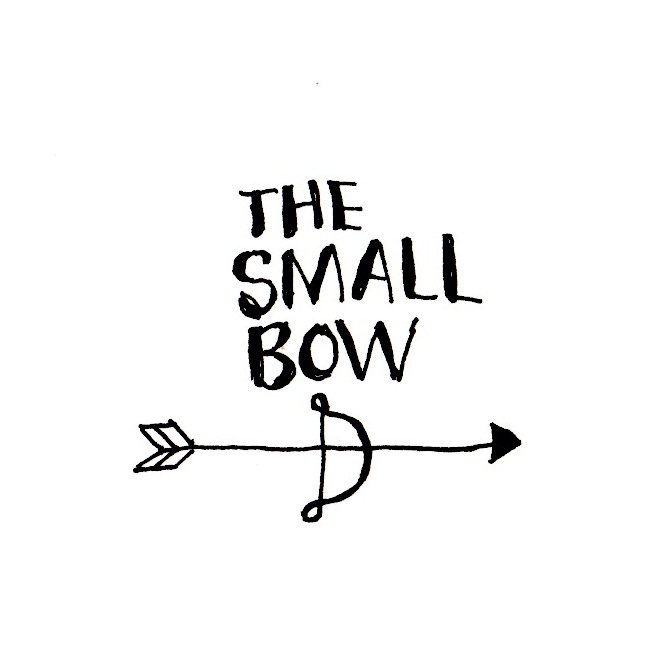
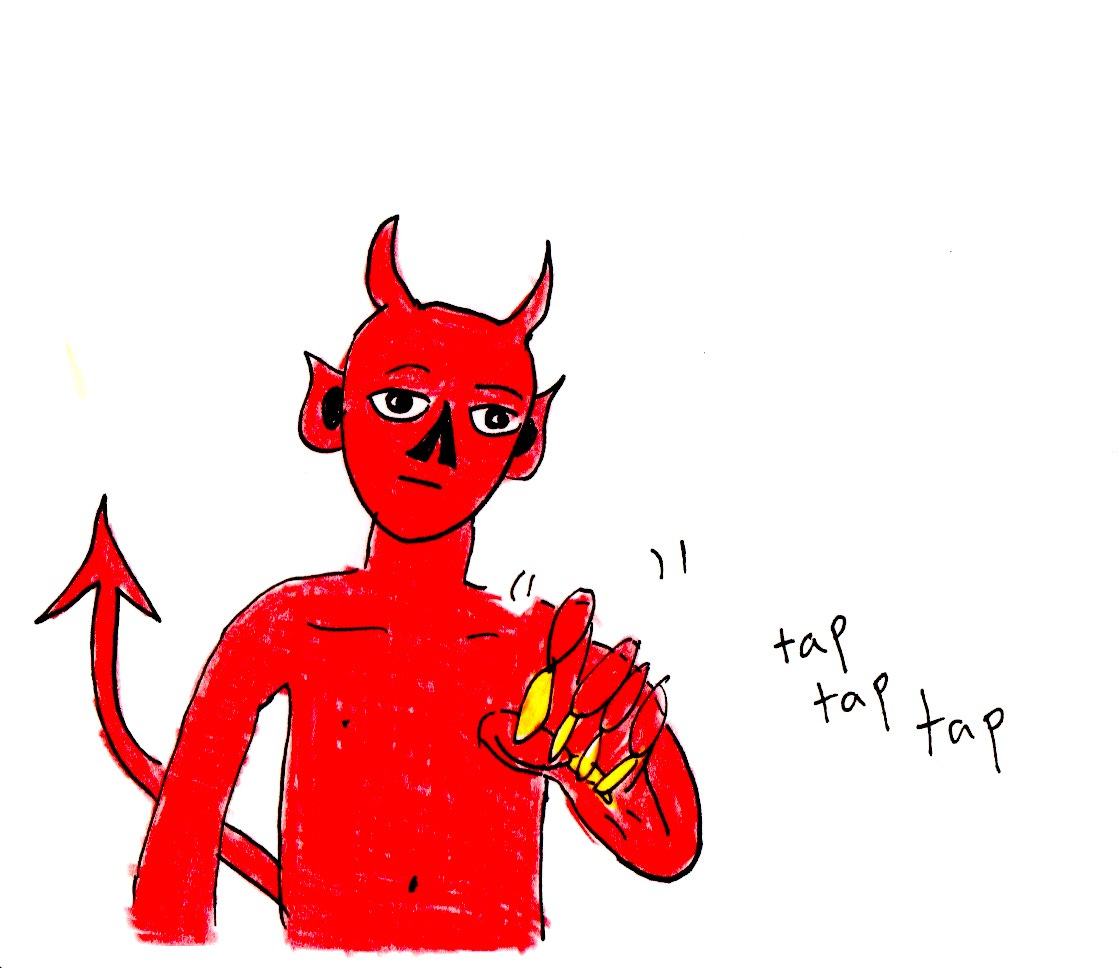




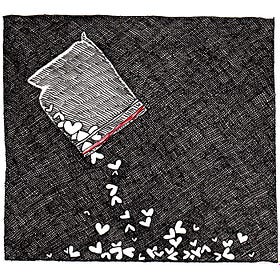

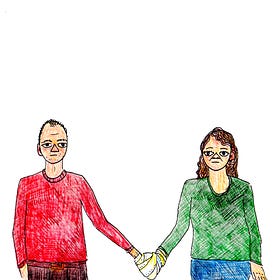

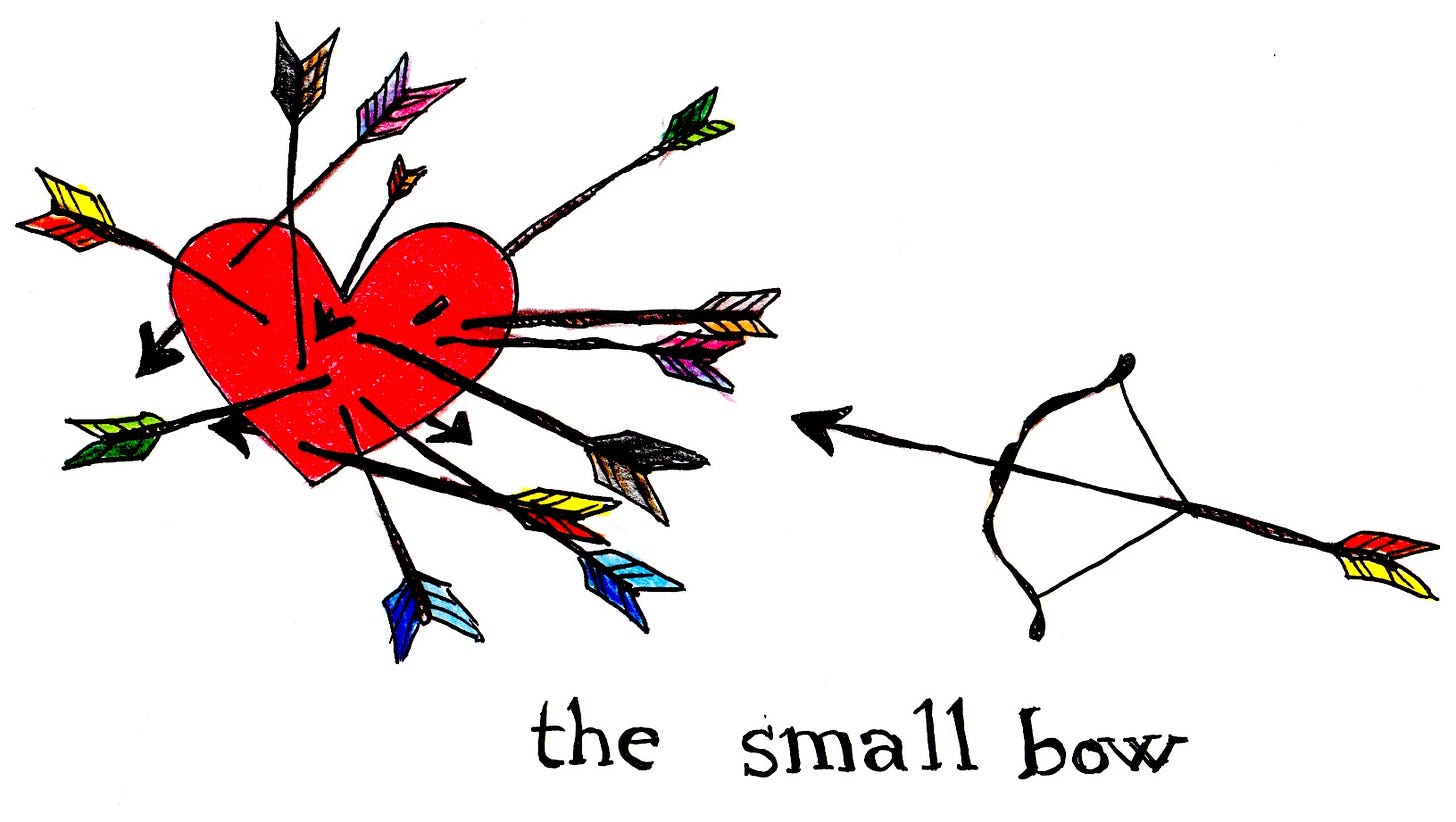
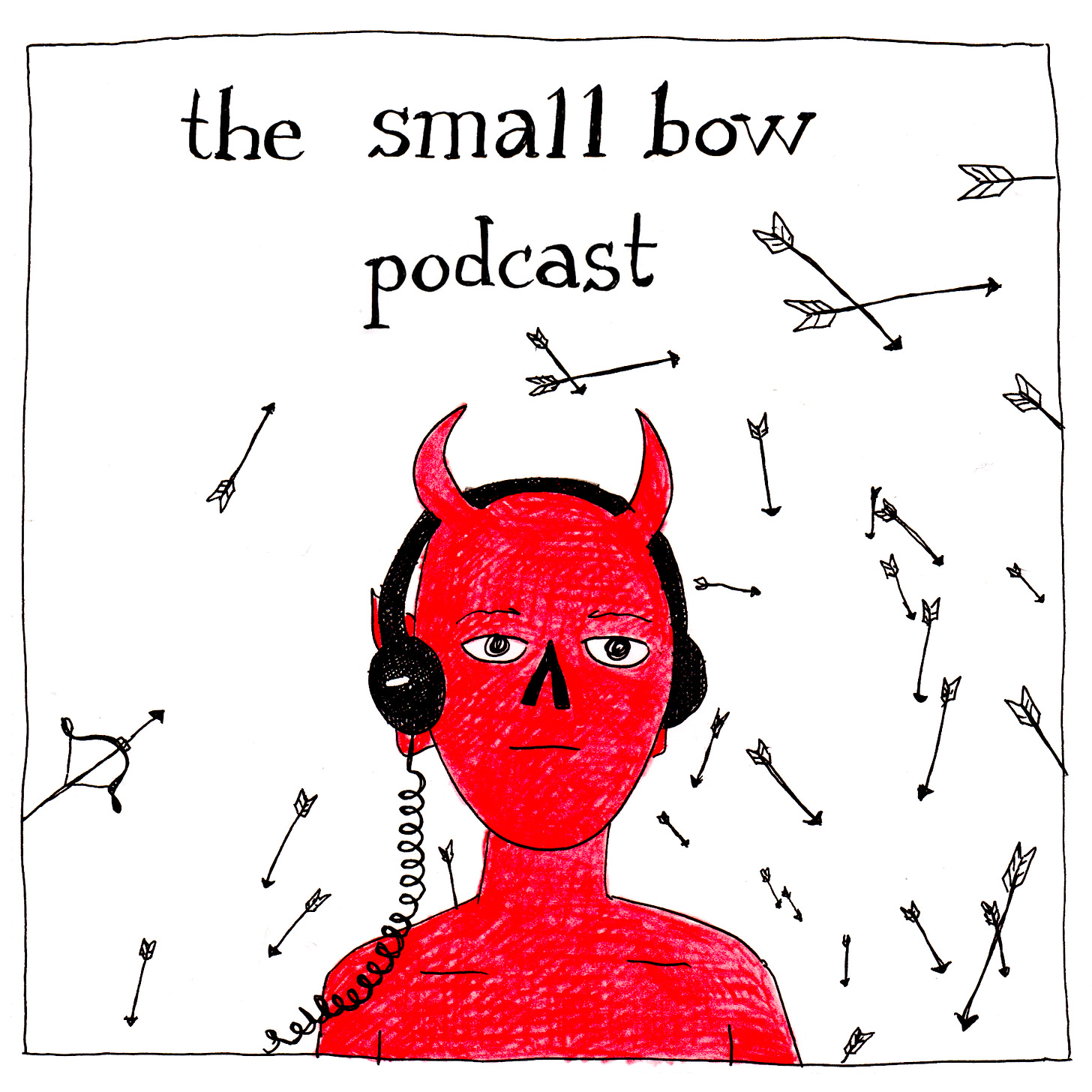
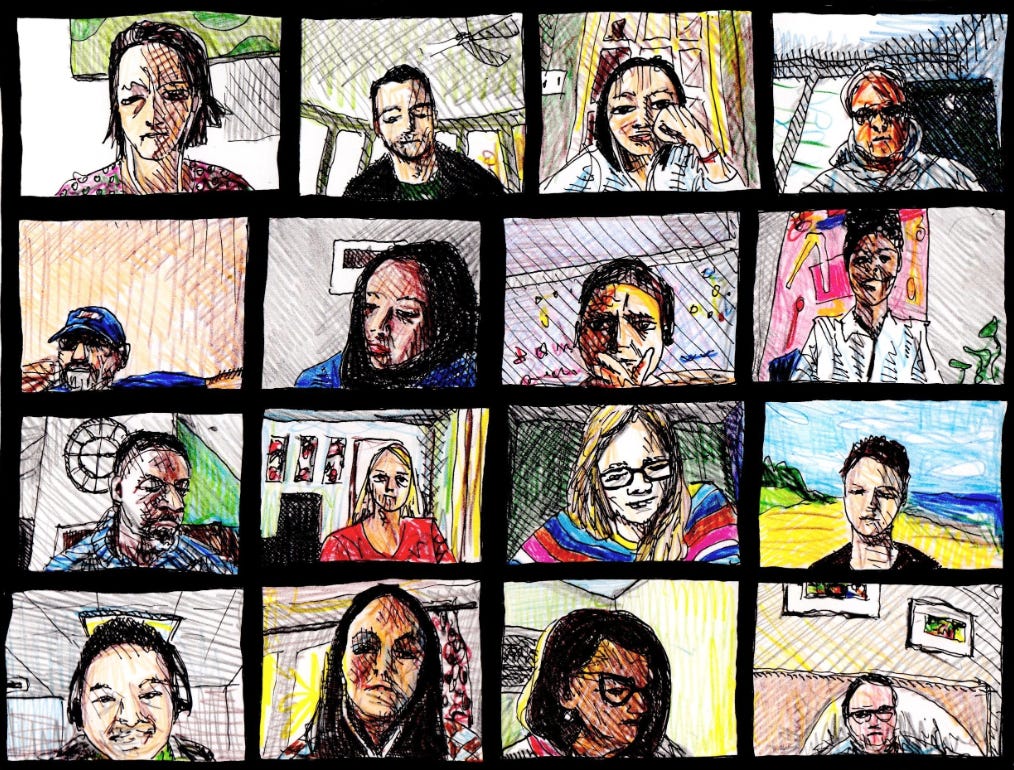
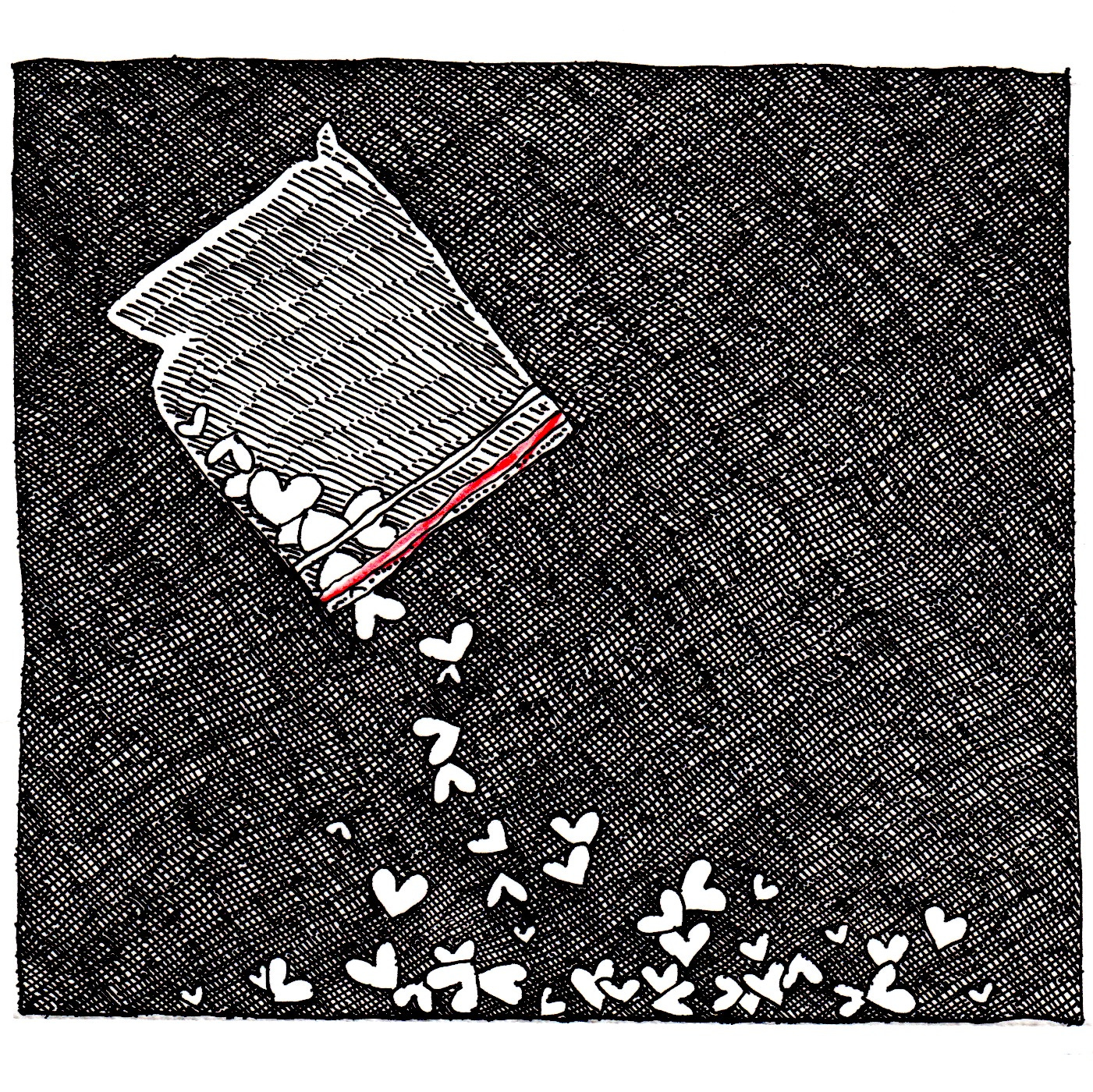
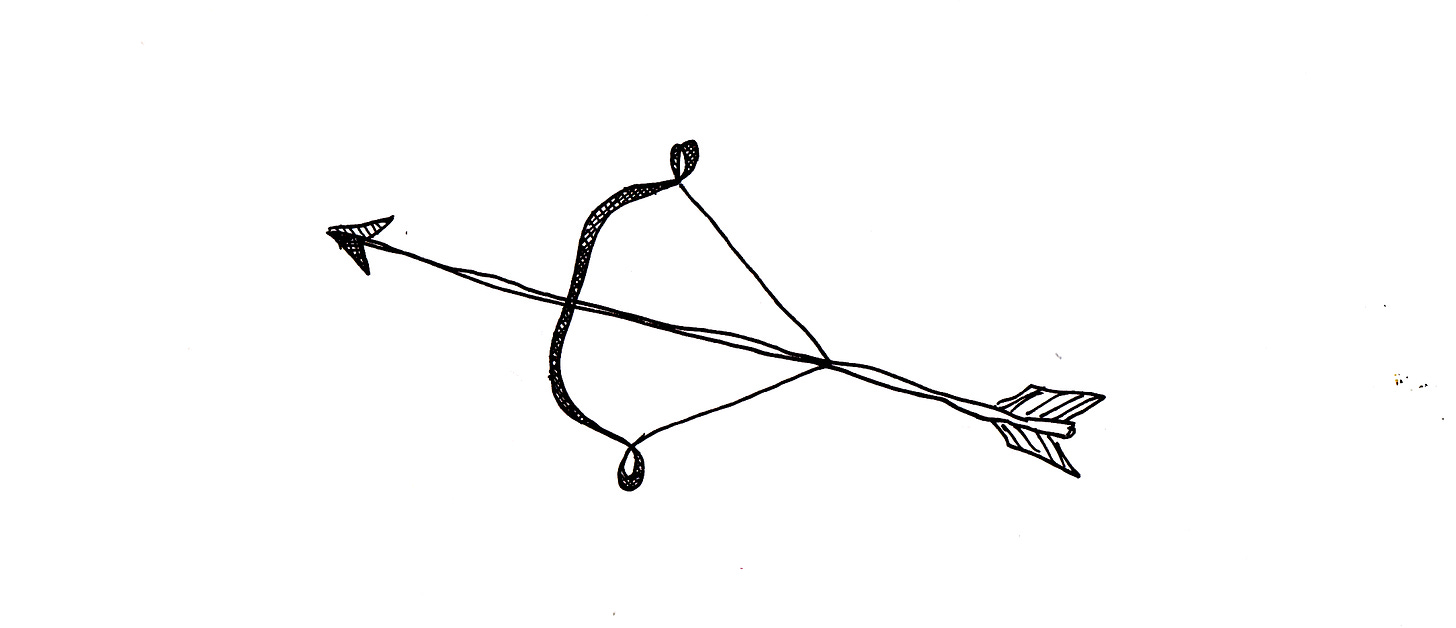
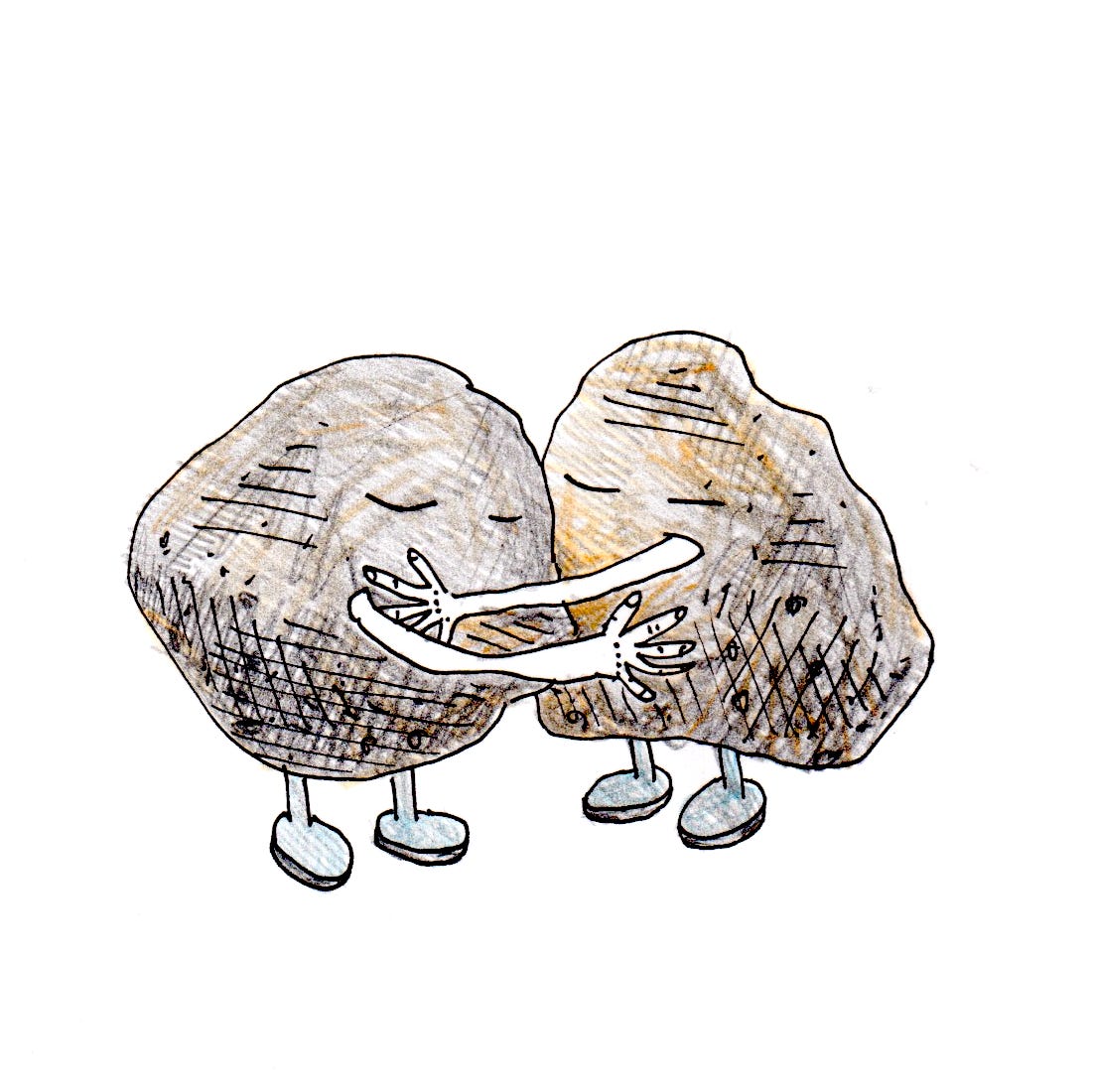
I use the VirtualEMDR self guided website for about $70/month for unlimited sessions. The interface is excellent and customizable. I have done many sessions over the past several years, usually at night or on a weekend, and it has been life-changing when talk therapy is stalling out. It’s exhausting, and it brings up memories that I didn’t even realize were unsettling, like the light during a certain time of year. But once the memory is there, I can press on it, hard, until most of the venom is drained, and now it’s a simpler memory. I know that September is and will always have stressful memories, but they no longer feel like active threats. Staying in the session to exhaustion, with a fast figure 8 pattern, works best for me. I pick a simple statement to repeat over and over silently to describe what I am trying to desensitize. “The fall light feels unsafe.” I will pick an even simpler one to install a positive thought pattern. “I am safe right now.” The statements may evolve as I am repeating them. Then I fall asleep afterward, and sometime over the next day or two I realize I feel noticeably calmer. Sometimes I do multiple sessions on one “memory.”
EMDR is never something I look forward to, but I know it usually works pretty quickly. I go back to it for a few sessions when my anxieties ramp up every year or so, which is a pretty strong attachment for distractible, avoidant me.
Great topic. Look forward to reading the text and the comments.